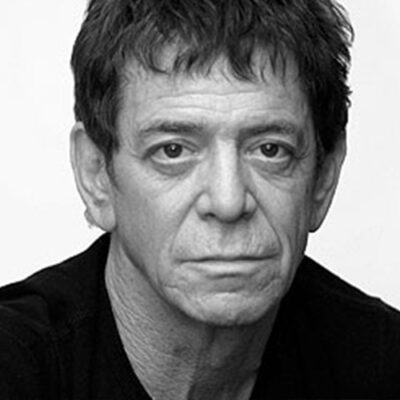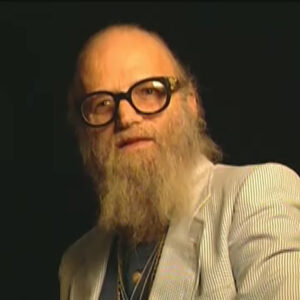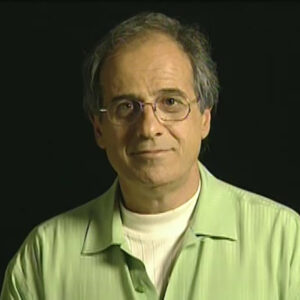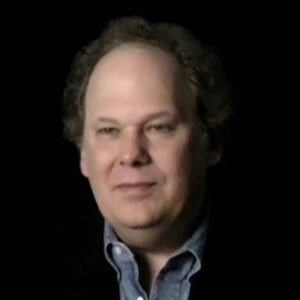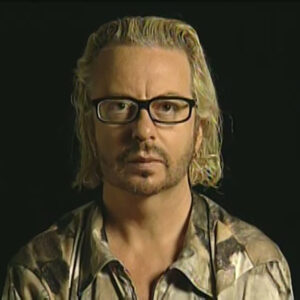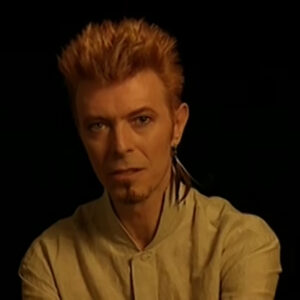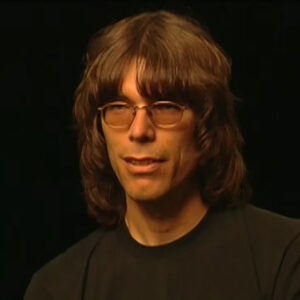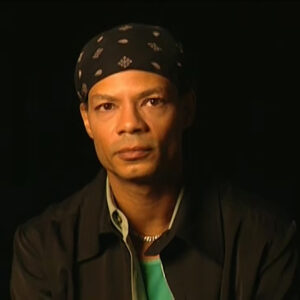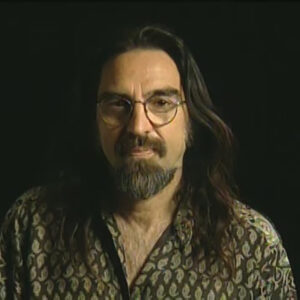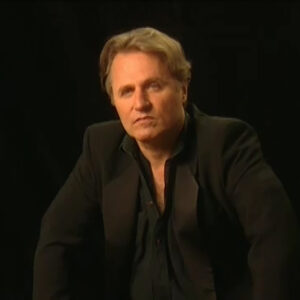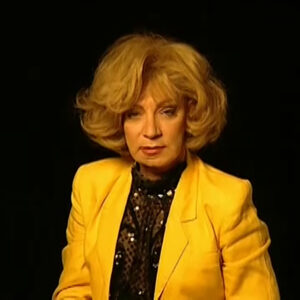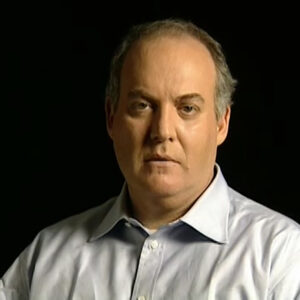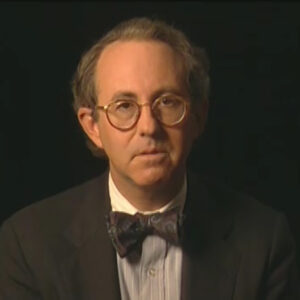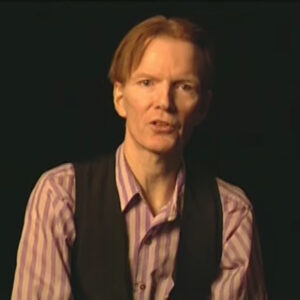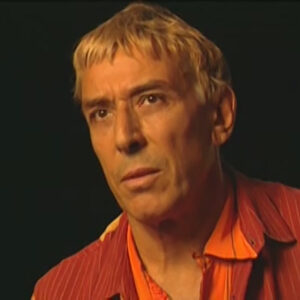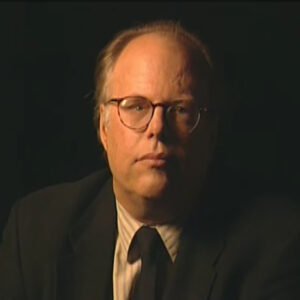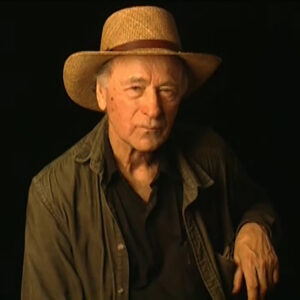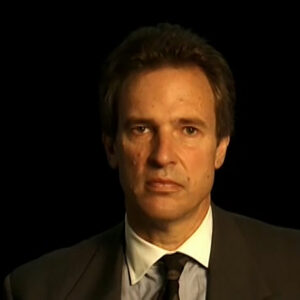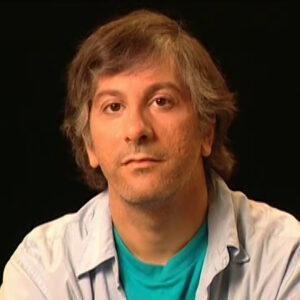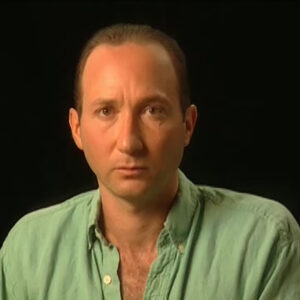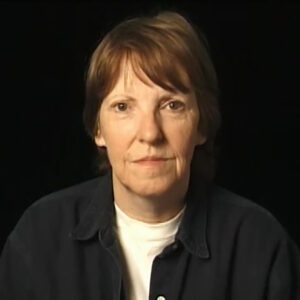Speaker Let’s see, I I was at Cornell and Gerard came to Cornell and he was kinda cute.
Speaker And then Cornell said all of us to go to visit to go to New York to visit all the, you know, famous artist. And one of the studios we visited was Warhol.
Speaker And when I went up to Warhol studio, nobody was there. I don’t know where he was. But anyway, George suddenly walked across the hall and I knew him. And I stayed. Um. He said, Do you want to do a movie? I said, Yeah, sure.
Speaker So then I would go back to Cornell and then he would come back to Cornell and get me and bring me back on the bus. This was like Girard’s thing. This is Jarraud like rope girls in all the time. And if you ask Geraud if he invented me as far as he’s concerned and.
Speaker He did buy me a leather outfit and he did buy me a leather whip and I did dance with him and he usually choreographed everything. So I guess he did in that.
Speaker Very, very important frontline. That’s wonderful. That’s the Coast Guard commandant on the left side just standing here.
Speaker That was great.
Speaker Can you describe rerolling? Describe for me having the world’s screen test. That was like the first movie that I ever did.
Speaker For Warhol joyrides had come to the factory and you’ll be in this movie. I had no idea what he wanted. So I came to the factory and there was Andy Warhol and he was, you know, like farting with a camera, which was, you know, kind of normal. He was always like weirded away and farting with something. And then all of a sudden they put me on a stool and the camera was facing me. And then he turned the camera on and then he walks away and they all walked away like they’re bored. And I’m standing there, you know, looking at a camera. And so this was a screen test. And so what really happens is that you just look at a camera for so long and what happens is finally your true personality sort of like leaps out because you can’t hold your pose anymore. So it’s really interesting screen test. Like I said, Salvador Dali do a screen test and he did this pose like, you know, and he couldn’t hold it, you know. So that’s sort of slide down his face and sort of slipped out his neck and stuff was funny, is like interesting. And then other people would, you know, be like really, really shy like this. And then all of a sudden they turn into these monsters. But it was neat. It was great. Anyway, that was the first movie I ever did.
Speaker I don’t consider it a movie, but. Well, no, I do consider it a movie. It’s a great movie.
Speaker But anyway, I think Billy name is the one to put them all together. And I think Paul Morris is the one that came up with screen test. And I think Gerard was the one who did the. We made sure the book. I don’t know. Maybe. But anyway, I know that he wrote poems to each one of them. And then there’s a face, a clip. Everybody worked together in those days. It was not like later on.
Speaker Then the next movie, the next movie was ridiculous. So there’s there was this guy, Ronnie, to values used to write plays and nobody would do them. So Warhol did them and he thought that I was, you know, the next diva. And so but actually, I could act. I mean, I went to Cornell and I took acting there. I don’t know why. I mean, I was supposed to be an artist, but it was boring. So I. I did know how to act. So he, like, gravitated towards me. Said, you know, this is what you know and this is your role and everything. And I ended up in this play, but that there was a script but there was like nothing, you know, you didn’t have to follow the script if you didn’t want to medevacked world, just turn on the camera. And then he sort of stood there like, you know, dumbfounded. And people did what they were supposed to do. And at one point and Hedy Lamarr, there’s the camera kept on running and Warhol was going, well, you know, there’s more. There’s more. And we had finished our scene. And so Ronnie developed comes out and takes a glass of water and drinks it and then dies of poison. I mean, you know, sort of like he’s like an Italian baroque play. And we look at him and Warhol goes, there’s more. So he gets up and and kills himself again. So it was it was. Anyway, that was Harry Lamar.
Speaker That was that one. Can you tell me about the velvet? Sort of. You were there when the velvet started hanging out the factory.
Speaker Yeah. Barbara Rubin came in and said that there was this great group. I didn’t really hear him. But Warhol all heard of my guest and he said he liked them. I don’t know. But all of a sudden, they were there. They were like when I first met them, they were like our group and they were our group because of the way everything else was ours, because nobody else would touch him. So they became sort of like outcasts. They they became a part of us, a part of the whole thing.
Speaker And the world was putting on these big you know, I don’t know, it’s kind of trying to do these big spectacular, as he was also trying to do, you know, like movies where he’s trying to, you know, it’s what everybody was doing. Happenings, you know, on Rauschenberg would do were happening and stuff. But Warhol, he didn’t do stuff like that. What he would do is he put the Velvets up there and then maybe we would dads, maybe there’d be a movie behind us. And of course, later, all of this gelled into the exploding plastic inevitable, where I even bought a hall and, you know, put the whole deal on and then took everybody to L.A. and suddenly we were on tour, you know, but in the beginning now they were just this group and they all dressed in black, which was cool.
Speaker They didn’t talk just great. Mo never talked, Lou talk. He was really sarcastic. He was fabulous. Lou had great. Timing, so anything he did was really good. John Cale had great presence and a big temper. Sterling was a really sweet guy. Cause you never knew it because he was always standing in the back.
Speaker But they definitely fit in.
Speaker When we went somewhere, they’d be there to, you know, sort of like black Baltar’s all dressed in black. We were a team, you know, when Andy went out, we all went out stupid.
Speaker It’s beautifully said. Can you talk about with dancing and women? So you were with dancing. What the hell is that with Dancer? Well, what were you doing?
Speaker Well, we want to look at this a second.
Speaker And this brings any what is magazine happening in L.A.?
Speaker In San Francisco? It’s on my way west. Not happening.
Speaker Well, it’s happening with the exploding plastic inevitable. We want that trip. Yeah, yeah. You must be right.
Speaker Yeah.
Speaker I don’t remember any of these photographs. The only thing I remember, the only thing I remember about San Francisco is that after we were in Los Angeles and we played at the trip and the trip was shot down and we weren’t allowed to do anything all of a sudden and we all thought, you know, that we were really great. But obviously, no one else did because we weren’t received really well.
Speaker But then so many all of a sudden said, you know, you’re going to San Francisco y will want to go home. So I don’t know. I took a lot of drugs and then someone said we weren’t going and I took a lot of Placidyl. And then we were going.
Speaker So I took more drugs and we ended up going in and we ended up going into this big hall and everybody said, you know, like, whatever you do, don’t drink anything because it’s full of acid.
Speaker So, you know, immediately I was like, you know, not drinking anything. We were careful about what I drank. And when we went into the hall, the mothers of invention were on the stage and they were like imitating us. They had like dancers on the stage.
Speaker I don’t know.
Speaker We just got really depressed because they were doing it such a stupid way was. So I was just like, what Zaba is, you know, there was like no art behind it. It was just this sort of like, you know, little Ringley do, you know, kind of take off thing. So I think Lou’s really mad, but we performed anyway. And I remember that the Velvets, they all turn after the performance. They turn there, they turn all their instruments on and left them near the speakers. So they just created noise and they all just walked away.
Speaker So we want to get out of there. I hated San Francisco. I hated hippies. Hippies were scum.
Speaker But anyway, that was beautiful because that’s the first thing I never understood why they were there. And those. Imitating what you guys were doing. That was the context of it. Can you go back to the trip a minute? Because I think that is an important moment. Any memories of that? And was there came to see you guys?
Speaker No one really came to see us. But then I heard later. No, I didn’t know anybody. I didn’t know. What did I know? But anyway, I heard later that, you know, a couple of people came to see us, you know, and they hated us. So this was good. You know, we were programmed, you know, negative criticism is like really good. Negative advertising is even better. People want to see that. It’s like pornography, you know. Wow, that’s so bad. Oh, good. Let’s go. But people started showing up a little bit, but not really. But the trip I got, I thought it was great. The trip was like really weird. Was like this small little black box. And the Velvets came on and drawn and I had all these, like, weird dances that we would do like for waiting for the man, you know, we would lift weights for.
Speaker I remember the songs, but like for Black Angels Death songs, I only had strobe lights he would dance with, you know, just like strobes were just invented or something. Flashlights, strobe lights. We were out of it too then, you know, of course, the whips for a Black Angel’s Death song. What is it? Oh, Venus in furs, right. For Venus in Furs. It was this incredible web dance which was kind of really sexy in a way drawn. I liked each other.
Speaker We were sexually orientated to each other and because I was too high, but we liked each other.
Speaker So that dance was like, really that was hot. And then, of course, Harrower, what he’d pull out his giant plastic, you know, syringe that was about this big used to excite everybody. Sometimes they’d shoot up. Probably sounds real bad now because, you know, heroin is such a no no. But back then, I have to say that drugs were I mean, you know, they’re terrible. You shouldn’t take them. But back then, drugs were sort of something you did because you wanted to, you know, graduate.
Speaker Nobody was doing yoga. We did heroin instead, much like of the Arab poets, you know, thought that getting drunk would get you closer to God.
Speaker Can you say it was really choreographed, not impromptu?
Speaker No, no, no. Everything was impromptu. Nothing was choreographed. What I mean by choreographed is Gerard would drag something up on stage and go, you know, I’m going to do this. And I’d go, oh, Jesus. Oh, good. OK, well. I’ll do this, you know, and then I would just build like that. Even the movies I say they’re right. I wrote the script when I did Chelsea Girls. You know, Peper didn’t learn her line. She didn’t even know it. So what good was the script? I was the only one who knew the lines.
Speaker Everything was if you worked with our dean. God help you. If you tried to follow the script and there was genius. You. You just kept your wits about you.
Speaker So it really does sense what Warhol really was after was not anything choreographed. It was finding incredibly creative people who could ad lib, who could be.
Speaker We all felt that we were working toward something. We couldn’t put it into words and perhaps Warhol could put it into art. He wasn’t to, you know, vocabulary oriented, but he did creative things like art. I mean, he could do, you know, like the electric chair. And we’d get it. So we all in our own way and our own mad, you know, crazy way worked towards that. I mean, we all had twip books and we all, you know, did things that probably weren’t very artistic. But nevertheless, when we were around him, it was all working for a cause. If somebody did something a little boring, he was out. There was a structure.
Speaker Tell me about. That’s wonderful. We have had prowling around the country that night. I’m trying to imagine this. I guess a bus than you are. We get off and go off to college and do.
Speaker Cornell was one of the ones Provincetown.
Speaker Provincetown, just as it was before I was in New York.
Speaker The psychiatrist convinced because that was one of the first performances.
Speaker But I can tell that I didn’t go to I went to the first time we had to perform was at this weird thing that Rauschenberg and all the brogue were also at. It was in Philadelphia that I remember, but there was no bus. So how would you get the private. I don’t know. People would give us rides or maybe we you know, I don’t know this guy when we were in L.A., this weird bearded guy called Ferguson or something like that. And what was his name? But anyway, he had a station wide and that he obviously was a guy who packed all the drums and stuff.
Speaker But we are traveling was always a very uneasy situation with Warhol. There was no organized bus with someone with a little whistle and everything. I mean, half the time we didn’t know if you were going with them or not or, you know, did Paul buy you would take it. Well, he didn’t buy me a ticket. Well, I guess you’re not going well, you know, I can’t stay here. Well, you know. Too bad. It’s very uneven. So traveling wasn’t so good and then traveling was good because like in Los Angeles, we ended up in this, you know, this insane castle. I don’t know why. I mean, later on, I learned that it was a castle that they put any bad than, you know, just to shut them up. But all of a sudden, we’re living in this castle, you know, and things are very broke, you know.
Speaker And, you know, Lou’s sitting at a long table and, you know, writing and, you know, people are skulking around and being very grand. And there’s Nico, you know, like, you know, with daffodils and, you know, parakeets. And it was interesting.
Speaker Is think can you talk about Lou’s relationship with Andy during the Velvet Underground period or during? Any thoughts about that?
Speaker I know that Lou really likes Andy, and he liked him then, too. Lou had a thing, Lou look, wasn’t always sarcastic, you know, Guy. There were other times when if Lou was excited about something or if, like, you know, all of a sudden he discovery, I don’t know.
Speaker You know, like doctors who operate without their hands or something or, you know, you get all excited and really excited and, you know, you just be talking a mile a minute and everything and everything was like, really, really, you know, like so he he he and Andy would have that together.
Speaker They would they would talk like that.
Speaker But I don’t know anything about his relationship with Eddie except that he liked him and that and he was really well, you know, it’s hard to talk about Andy. Andy was there. And if you took him the right way, you know, you got a lot out of him. You took him the wrong way like he did, you know, thanks to you very well.
Speaker Any other thoughts about the whole period?
Speaker Yeah. The the thing that we all did together that was really great, that Lou was a big part of it was the plastic exploding inevitable. And Andy bought this place and it was really magic. It was great. People from all over would come. I mean, you’d go upstairs, you know, to look at everybody dancing and, you know, you’d stumble over Tennessee Williams and then you’d see, you know, I don’t know this other famous, but it was just amazing. But how long did these performances go on for?
Speaker Hours and hours and hours into the night? No, no.
Speaker Lou had as I said, he would say a certain amount of songs. He’s very strict about what happened. He’s. He wasn’t like, Andy, you know, the camera’s still running. No, no, no. Lou was very strict about that. You know, Nico had to do this and that and, you know, certain songs came on and stuff like this. I mean, you know, he’d get pissed off or something.
Speaker You know, have an argument that he was really together and he was very together about his music and so was getting so all that without his name, John Cale. He was brilliant.
Speaker But Lou’s interesting, Lou.
Speaker Always when I knew Lou, he always felt or he always used to make me feel like he thought he owed Andy a debt. And then I understand that they had bad times, but I wasn’t around for that period. Well, then he wrote that song again. So I still feel that way. There was something really good about Andy and Lou, and he knew how to use Andy well.
Speaker Can you talk about songs you draw you? I’m sure you’ve heard the album. Do you think that’s Andy to you? You know Andy so well.
Speaker Was there that period Lukash?
Speaker Yes, certain side of him. And it was something you used. He wasn’t someone who said, this is me. You know, and everybody do this. And it was like like with.
Speaker And Lou, also the other thing that you see, this is why I really like Lou, because Lou just had really trashy chit chat, trashy taste, like I would say that again, Lou just really had trashy taste like me.
Speaker I mean, Lou loved transvestites. Lou loved, you know, like dark alleys and stuff like that. I mean, he just liked that kind of stuff and so did I. It was great. It was sexy to us. And that’s what his songs are about to.
Speaker You go on about get a little bit more. That’s beautiful. That was just sort of this observer of the people that you collected or was it more.
Speaker Now, he was part of us. Absolutely part of us. He was not just an observer at all. There were plenty of observers and we treated them like trash. You know, they didn’t have real lives. You either had to be part of us or not. Lou was a member of the moles. I mean, he was a definite you know, Sterling wasn’t Sterling was a visitor whom we all like. I mean, of course, I don’t know what planet she came from, but she’s sweet. Well, in the castle, I had to share a bed with her, you know, because it was two girls and, you know, they ran out of beds because Nico needed such a pink bed. And I remember Maureen would never take her clothes off, you know, when she went to bed. And I finally realize she was scared of me.
Speaker But anyway, I know Lou was definitely one of the group he contributed and he knew what he was doing. He knew the image that he cut and he knew what he liked.
Speaker And he didn’t give his good.
Speaker That’s incredible. What that feel like? Anything else? Well, I think the interesting. Did you follow his career later? Do you have anything to say about how those initial moments exploding would have influenced him later on in life?
Speaker Do you listen to his music? Have you heard the latest album? I don’t follow his career.
Speaker When someone puts on a song, of course, I recognize his voice and I listen to it. I really like his music. But I have to say, you know, I don’t follow anybody’s career.

